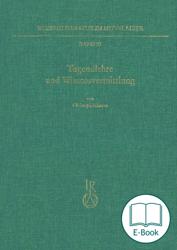By centering the category ‘knowledge’, this book offers a new analytical access to Thomasin von Zerklære’s Welscher Gast. In doing so, it can be observed that various areas of knowledge are used to convey a kind of ethical orientational knowledge, as moral doctrine and learning go hand in hand. The structure and the various strategies used to present existing knowledge and teaching contents are always aimed at the precise context, the current theme, and the educational purpose. These findings enable an adequate understanding of the work, thus providing a new overall interpretation.
Thomasin’s von Zerklære Welscher Gast is the first detailed doctrine of courtly moral and virtue in medieval High German language. It was written in Friuli in 1215/16 where Wolfger von Erla was patriarch. Thomasin’s innovative work provides an insight into various areas of knowledge which were relevant for the courtly culture of the early 13th century. Due to its simple outer appearance, its apparent lack of structure, and the blending of different themes, traditions, knowledge, and teaching contents, Thomasin’s Welscher Gast has long received very little of its well-deserved attention. Recent research has almost exclusively focused on the large cycle of illustrations accompanying Thomasin’s work in nearly all of the manuscripts, thus providing a biased picture which does not live up to the work itself.
By centering the category ‘knowledge’, this book offers a new analytical access to Thomasin’s Welscher Gast. In doing so, it can be observed that various areas of knowledge are used to convey a kind of ethical orientational knowledge, as moral doctrine and learning go hand in hand. From this point of view, Thomasin’s seemingly disparate way of organising his work appears to be intentional: The structure and the various strategies used to present knowledge and teaching contents are always aimed at the precise context, the current theme, and the educational purpose; his system is variable and dependent on the situation. These findings enable an adequate understanding of Thomasin’s Welscher Gast, thus providing a new overall interpretation.
„Ursprunglich als Stellenkommentar konzipiert, verbindet die Untersuchung eine Tiefenerschliesung des Textes mit thesengeleiteter Interpretation. Das Einleitungskapitel bietet neben einer Vorstellung des Werks und seines Autors und einer systematischen Aufarbeitung der Uberlieferungs-, Editions- und Forschungsgeschichte auch eine vorzugliche Einfuhrung in den Illustrationszyklus des Welschen Gastes auf dem neuesten Stand der Forschung.“
Von Christian Schneider
In: Germanistik Bd. 60 (2019), S. 203
Dr. Christoph Schanze was born in 1982 and studied German philology at the University of Tuebingen as well as music at the Conservatory in Trossingen. Following the final examinations (Staatsexamen) in October 2007, he started his doctoral studies in German Medieval Studies at the Justus-Liebig-University in Gießen, where he received a stipend granted by the Graduate Centre for the Study of Culture (GCSC). Since November 2010 he has been working as research assistant for the professorship of German Literary Studies with a focus on the Middle Ages/Early Modern Era. In July 2015, he was awarded a doctorate for his work on Thomasin von Zerklære.
His research priorities lie in the educational literature of the High and Late Middle Ages, courtly love poetry, and the courtly romance (with special emphasis on the narrative examination of ‘things’ and the poetological implications of brightness and darkness).


 Table of Contents
Table of Contents